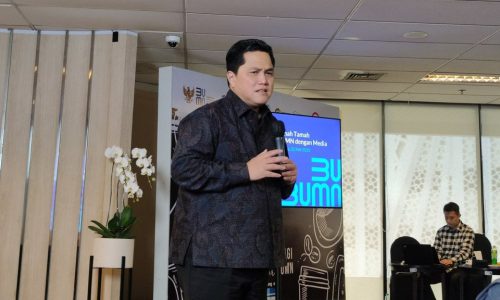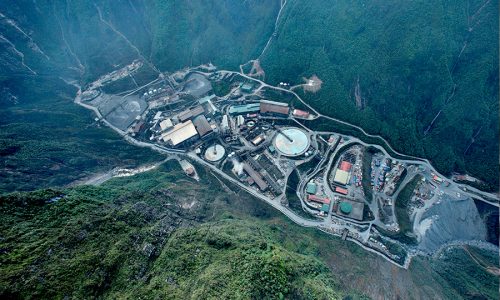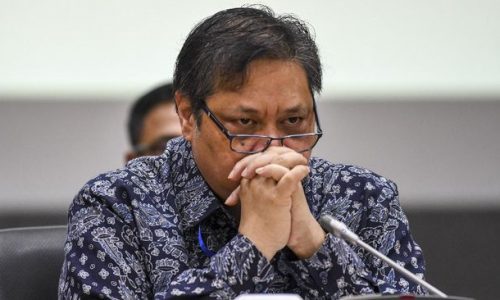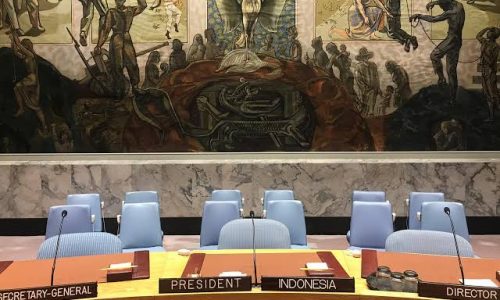The Special Autonomy Fund has failed to become a push factor to eliminate the so-called natural resources curse in Papua and West Papua provinces. The fund has been used to increase gross domestic product but it did not improve other sectors especially education, health sanitation and forest condition in those provinces.
The Ministry of Finance claimed the government already disbursed IDR 138.6 trillion fund for 20 years of the first phase of the special autonomy fund.
“Poverty rate in Papua and West Papua is still the highest [compared to other provinces],” said Berly Martawardaya, an economist at the Institute For Development of Economy and Finance (Indef), on November 19, 2022, during a discussion on the “Natural Resource Curse in Papua” by Indef and Greenpeace Indonesia.
Natural resource curse is a condition in which the abundant natural resources does not necessarily transform the natural wealth into human welfare.
Development indicator
In his report, Martawardaya used data on the development indicator that review the efficiency of local administrations’ capital expenditures from 2011 to 2019.
According to the Cabinet Secretary website, in 2020 fiscal year the government allocated IDR 374 trillion of Special Autonomy Funds for Papua and West Papua Provinces and IDR 680 trillion of Additional Infrastructure Fund for both regions. Those funds were aimed at:
- Improving planning and effectiveness of budget spending;
- Enhancing effectiveness in the implementation;
- Improving accountability through disbursing the budget based on implementation performance;
- Strengthening monitoring and evaluation by establishing synergy among related ministries/institutions;
- Maximizing the use of budget to be in line with national priorities by conducting discussion with related ministries/institutions;
- Shifting the focus and priority of budget spending to education, health, and infrastructure sectors;
- Improving Special Autonomy Funds and Additional Infrastructure Fund’s governance by strengthening the roles of Internal Government Apparatus Supervision (APIP) in monitoring and providing recommendations.
Education sector
Martawardaya said that in education sector, Papua and West Papua had the lowest efficiency achievement in terms of local administration budget. Both provinces lost 30% of efficiency.
Papua and West Papua have very low supporting facility availability. In 2020, both provinces had the biggest ratio of junior and senior high schools in Indonesia, with 1 senior high school facility in every 502 kilometers.
“The pure participation rate for junior and senior high schools in Papua and West Papua increased but the rate is still lower than other provinces such as Maluku and East Nusa Tenggara,” Martawardaya explained.
Health sector
The health sector, especially access to sanitation, showed the same result. There was a big loss of more than 60% of health budget. However, the life expectancy rate achieved more than 90%.
“In sanitation, Papua and West Papua are also the lowest. The money did not go into remote areas in both provinces,” Martawardaya said.
“The low efficiency achievement in education and health sectors basically indicate the available supporting facilities are the products of local administrations’ capital expenditure,” he added.
The phenomenon on the big ratio can also be found in community health centers (Puskesmas) in Papua and West Papua, indicating that the local administrations have not been able to provide affordable access of the facilities to the people.
Environment sector
A similar fact can also be found in the environment sector, that is represented by the forest area. By using the indicator of the declining forest areas, Papua and West Papua recorded high efficiency. The development process in both provinces need raw materials and the land clearance has caused deforestation.
The new permit issuance for the development of oil palm plantations has reduced the forest areas in both provinces. The West Papua Agriculture Agency recorded that the awarding of oil palm oil plantation concession to 24 big companies covered a vast area of 576,090 hectares land, or 9 times of Jakarta province.
Why special autonomy fails?
Regional Representatives Council (DPD) member Filep Wamafma said that from the legal politic aspect, the state has been wise and good in formulating the special autonomy law and its explanations. The local administrations in Papua and West Papua had the authority, fund and budget. However, he said, the problem lied in the commitment, interest and power. The Special Autonomy Law has regulated the commitment but the government remains in full control to direct and decide every policy. Governors and regents in the provinces would not be able to fully implement the special autonomy law.
“Moreover, in the job creation law, the authority of local administrations has been returned to the government especially related to investment sectors and other authorities,” he said.
Apart from that, Wamafma said that the local administrations did not fully comprehend the content of the special autonomy law. The law mandated that 35% of the budget should be for education. In reality, the local administration only allocated 7%-9%. Therefore, it is difficult to solve the problem of illiteracy, lack of teachers, and education facility.
Wamafma also explained that indigenous people have simple knowledge on how to protect and support the nature. Meanwhile, the government and investors perceived the nature as a capital that can provide huge wealth for the state and become a source for government revenue. There is potential conflicts among indigenous people, investors, and the government.
“The government tends to take side with the interest of investors. I usually attend the people’s meeting and I can honestly say there is no significant impact for the environment, economic wellbeing, jobs and health from the presence of investment,” he said.
On the contrary, he said, the investment has created environmental damage, the loss of living space and areas and the loss of cultural heritage. The government has done little to protect the citizens.
Corporate conspiracy?
Chairman of the Papuan Customary Council (MAP) Mananwir Yan P. Yarangga explained that what happened to Papuans was a big conspiracy by multinational corporations. The Papuans fall victims into the hands of these multi national and global corporations.
“The Papuans have been at the level when they think they are not part of Indonesia. This is due to the accumulation of all visible sufferings of Papuans such as land grabbing, deforestation, ecosystem destruction and the murders of Papuans.
The conspiracy is developed by Indonesian government by accelerating and creating new autonomous regions in Papua. Instead, Papua has been divided by multinational corporations.
“Papuans understand that the spearhead of the interest of multinational corporations in Papua is the government. The people within the government have divided Papua,” Yarangga argued.
The Papuans understand that the global interest for their land is their natural resources. Powerful men have encouraged Indonesia to exploit Papua natural resources. After the COVID-19 pandemic and the Russia-Ukraine war, more countries have been seeking money to defend their countries and for that they need to exploit natural resources, including in Papua.
“Indonesia has become the lackey for the US and its allies to keep exploiting Papua for the interest of their countries,” Yarangga said. Investors and opportunists in Jakarta will follow the US and its allies to implement the roadmap to exploit Papua in the next decade.
“We forecast it will start in 2023. Jakarta has divided Papua [into smaller provinces], arguing for the sake of development acceleration and new autonomous region. At the same time, the government will strengthen the presence of military power to ‘sell’ Papua for multinational corporations, the US and China,” he concluded.









